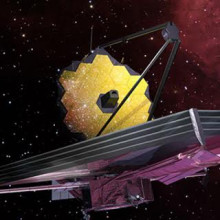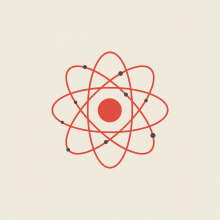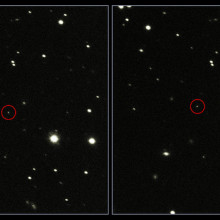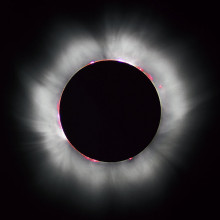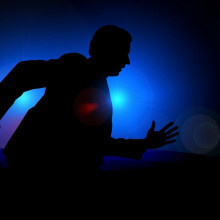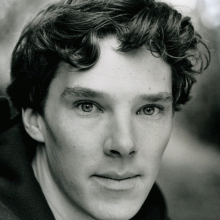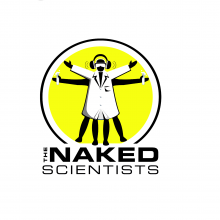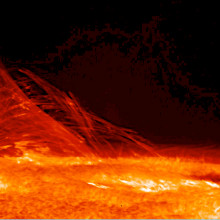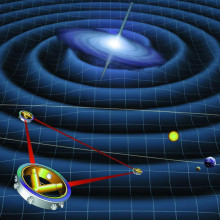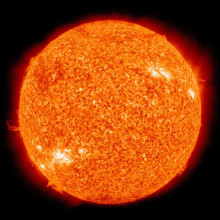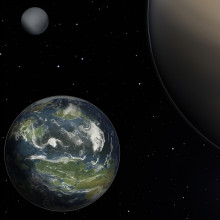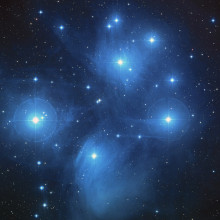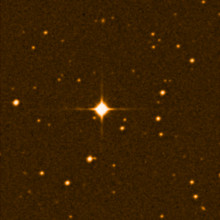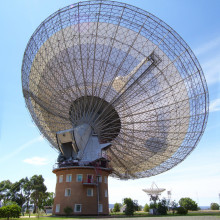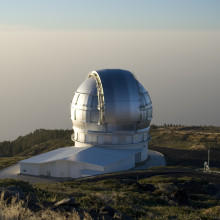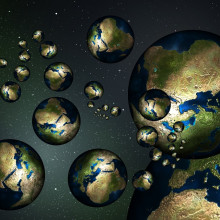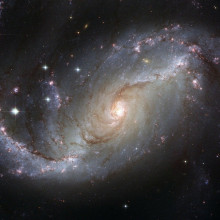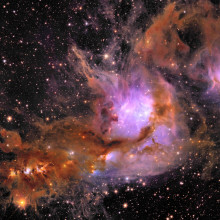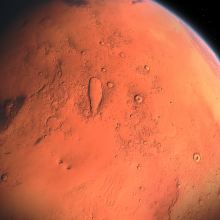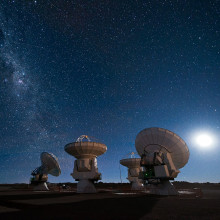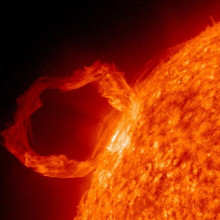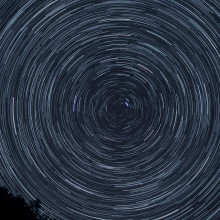Search
'Dead' galaxy stopped forming stars 13 billion years ago
... mostly empty and is dotted with galaxies. So understanding how it went from this uniform fireball of gas to what it is ... main tasks that we're trying to understand in contemporary astrophysics. Chris - How can you see back in time in that ... and understand exactly what their incidents are. In astrophysics, what we try to do is to understand time ...
Fusion energy research rewards science
... that we need to do to make sure we fully understand how these plasmas behave. But there is a confidence building ... to start thinking about the next set of problems about how we recover the energy, how we drive these reactions. I ... Brian - We certainly are. We're discovering lots about astrophysics, also technology developments, things like laser ...
Going for Gaia
... from us of about maybe a hundred thousand stars and how those stars were moving. Now out of a hundred billion ... one per cent of them all - a billion or so but, also, how those stars are moving. So we get three dimensions in ... And through that range, pretty well the whole of basic astrophysics will be fundamentally rewritten and produce a ...
Stopping Starlight to See Planets
Ben - How do we spot planets in the glare of their parent star? Ben Oppenheimer is associate curator of astrophysics at the American Museum of Natural History and he ... of the planet, and then we can get into really doing the astrophysics of these objects. Ben - So, you need to find ...
Big tech goes all in on AI
... was announced this week. Speaking with James Tytko about how the industry is embracing AI, Josh Cowls, from the Oxford ... model of these companies is really interesting in terms of how they actually try to market and sell AI. So Microsoft has ... cracking really difficult problems with health or with astrophysics or with whatever else, and how much you say, ...
Benedict Cumberbatch gets naked
... sort of social and ethical issues that are complexified how science presents itself in the world. I got talking and ... her and I got a call a few months I guess later saying how would you like to be the guest director of the Cambridge ... in Neuropsychology with Stephen Hawking's specialty, in Astrophysics. And just how on earth you answer the questions ...
How the Sun Works
Brian Fulton who is a Professor of Astrophysics talks about how the sun works, how old it is and how long it will last. ... lighting systems. Brian Fulton who is a Professor of Astrophysics talks about how the sun works, how old it is and ...
The Science of the Sun
... on us here on earth, and we're interested in studying how exactly it impacts us. But on the other hand, it's ... that understanding and then apply it to other areas of astrophysics. Ben - So what are the things that we're ... the things that we're most interested in is understanding how the magnetic field of the sun changes. So, the earth ...
Cosmic Vision from the European Space Agency
... Well, there are a whole range of questions starting from how does the sun work, how does the sun influence our lives every day, the weather ... class missions, the large missions, those are astronomy or astrophysics related. That sounds like the planetary people ...
Europe’s Solar Orbiter Mission
... Dr Alexis Rouillard from the Institute for Research in Astrophysics and Planetology in Toulouse, France, the ... speeds of 800km per second, and we currently do not know how that wind is pushed outwards to supersonic speeds. Dr ... solar wind using Solar Orbiter, which may help us explain how stars like the sun create supersonic winds. ‘By getting ...
A closer look at baby exoplanets
... and researchers are now trying to understand when and how they form. The known exoplanets are certainly an eclectic ... orbits the sun. Astronomers are trying to understand how these close-orbiting planets came into existence by ... Bouvier at the Grenoble Institute of Planetology and Astrophysics in France asks on its website: ‘Have you ever ...
Down to Earth: Spotting Skin Cancer
... since found a new home down here on Earth... This week - how searching for stars could help detect a deadly illness… ... Down to Earth from the Naked Scientists where we look at how the technology and science developed for space is used ... But this algorithm could be applied to more than just astrophysics or, indeed, seagull spotting. The same ...
A new Earth-like exoplanet
... paper, Steven Vogt. He is the Professor of Astronomy and Astrophysics. Hello, Steven. Steven - Hello, Chris. ... So it's number 581 in that catalogue. Chris - And how did you actually spot the planet or planets because this ... telescopes are going to find that tricky. So, how did you do the study? Steven - The study is done by ...
Developing Radio Telescope Receivers
... about her research into the physics of receivers to see how detectors like those used on the MRO can be made as ... detectors that would be used for cosmological or astrophysics observations from the ground or also in space. ... than non-superconducting detectors and in a world in astrophysics where we want to be able to detect more and more ...
Bigger, better telescopes
Ben - Douglas Adams found a very good way to describe how big space is. He said: "Space is big. You won't believe how vastly, hugely, mind-bogglingly big it is. I mean, you ... like the early galaxies, and understand them, and to do astrophysics, and find out how they're rotating, and merging, ...
Do we live in a multiverse?
... all have independently come to this remarkable conclusion: astrophysics, string theory and quantum mechanics. Astrophysics One of the biggest goals of astrophysics is to ... of the night sky is connected to the other; analogous to how on a world map Alaska and Eastern Russia appear far ...
Aliens on the airwaves
... interesting ways to potentially chat with alien life. But how would we go about broadcasting to ET? And how would know ... home. Michael Garrett, Director of Jodrell Bank Centre for Astrophysics, told Chris Smith about why radio waves can be ... a couple of quid. Michael Garrett, Jodrell Bank Centre for Astrophysics Can we use radio to find intelligent life in ...
How the Euclid telescope is mapping dark matter
... of looking 10 billion years into the past to track how the expansion and formation of galaxies might have been ... to look for the distorting signatures of dark matter and how that dark matter couples to dark energy through cosmic ... transform cosmology, but it will also transform modern astrophysics. Carole Mundell, ESA The truth is out there... ...
Meet our panel of 'egg-cellent' experts!
... new book, 'The Grieving Brain: The Surprising Signs of How We Learn from Love and Loss', shares the groundbreaking ... Matt Bothwell. Matt has a background in researching astrophysics, studying how galaxies evolved over cosmic time. ... as a science communicator, giving talks and workshops on astrophysics and has authored a book, 'The Invisible ...
Saltwater lake located on Mars
... on Mars. A team from the Italian National Institute for Astrophysics has discovered a lake under the planet’s south ... is about 20 kilometres wide, and full of liquid water. But how did the team discover this and what does this mean about ... University astrophysicist Carolin Crawford to find out how they discovered this lake. Carolin - Well, if you’re ...
The Event Horizon Telescope project
... Haystack Observatory and Harvard Smithsonian Centre for Astrophysics, and he's part of an initiative called The Event ... by its very nature, you can't really see into it. How would you be able to study something like that? Shep - ... Haystack Observatory and Harvard Smithsonian Centre for Astrophysics How the world's telescopes are joining forces to ...
Bee-keeping scientists!
... with bees you do occasionally get stung. Chris - Yeah. How's it going, the beekeeping? Eleanor - Really, really good ... high carbohydrate loaded with sugar. Yeah. Chris - Yeah. How's your dentistry doing? Are you alright? Dan - Well, I ... incredible, both in terms of what it will teach us about astrophysics and general relativity, and also just that it's ...
How does the sun burn in space?
... talking about. Here to help me explain is Professor of Astrophysics at the University of Manchester, Phillipa ... Kelvin - which is high enough. Will - So that’s how nuclear fusion works: But what’s going on with the ... question, and thanks to Philippa Browning, Professor of Astrophysics at the University of Manchester. If fire ...
Triple star systems could re-write the cosmic playbook
... - My name is René Oudmaijer and I'm currently the head of astrophysics here at the University of Leeds. Since about a ... got this glowing disc of gas around these stars. So how did you try and probe that then? What have you done that ... Chris, because one of the main things that has come out of astrophysics in the last 10 years is the detection of ...
Meet the Q&A team!
... - those are the Neanderthals. And she's also interested in how susceptibilities to different diseases that we see today ... of what Emma's saying about our evolutionary origins and how diseases play out in the past and really take shape in ... along, about 4/5 of the questions, straight away, astrophysics, black holes. Andrew Morris, now. Andrew's a ...
